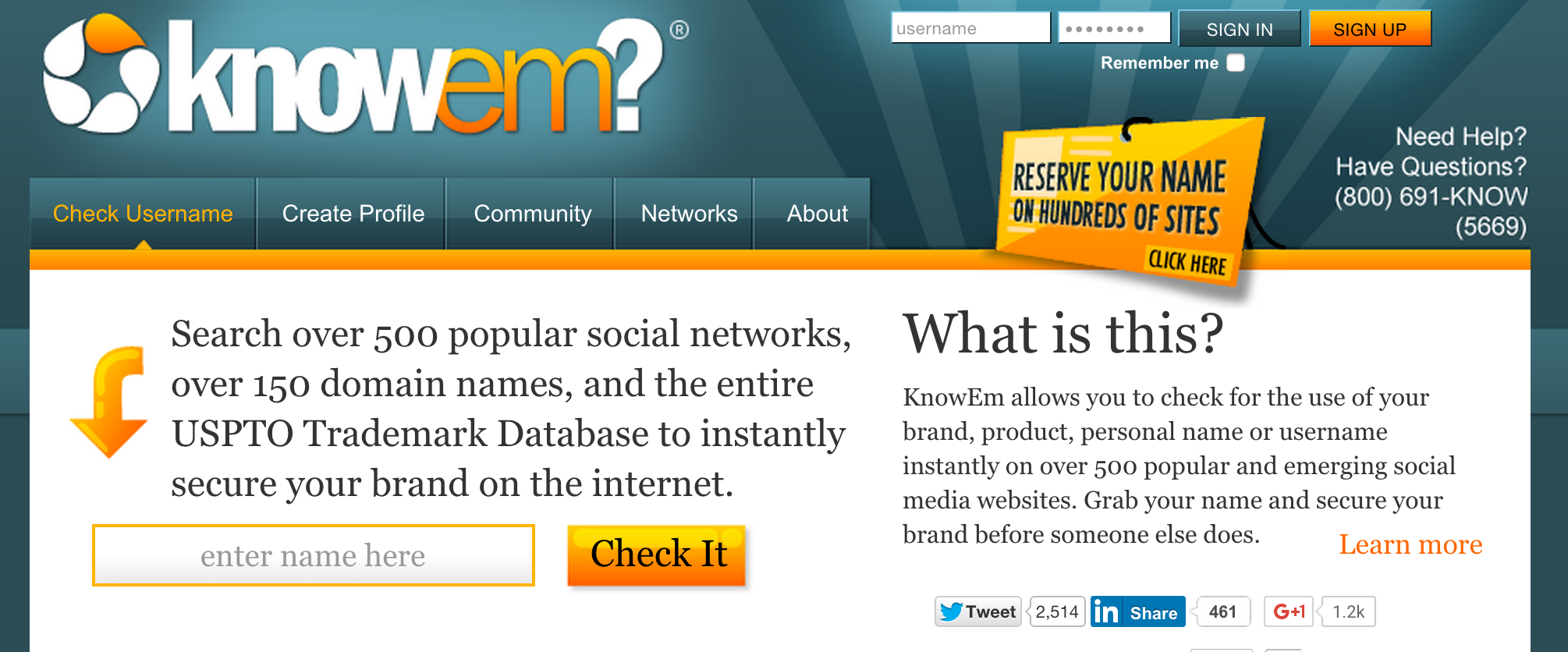
Choosing a name for your domain is a lot like choosing a name for your child. Some names come easily and feel almost inevitable (InternetMovieDatabase.com, John Jr.). Others are surely the product of a hard-fought battle between mom and dad (GoDaddy.com, Gertrude). And then there are the names that defy all logic and reason (Algorelovesyou.com, Inspektor Pilot).
While domain names can be all over the map, choosing one is a task that should not be taken lightly. Whatever follows that www. is going to be a customer’s first impression and a search engine crawler’s first meal. Like it or not, your domain name is the gateway to your online business, so before you settle on the first name that comes to mind, consider the following best practices.
Make It Unique
InternetMovieDatabase.com might be as generic-sounding as they come, but it’s important to note that the website was launched in 1990, a time when less than 3,000 websites even existed. Today, there are over 1 billion.
To stand out in such a crowded marketplace, the value of a unique name cannot be overstated. Twenty years ago, sites like MentalFloss, Coffitivity, and TechCrunch might have been called InterestingFacts, CoffeeShopSounds, or TechnologyNews. Today, it pays to put a creative spin on your name, no matter how straightforward your website’s subject matter actually is.
Aim For A .COM

While it’s important to have a unique domain name, you don’t necessarily score points for going against the .COM grain.
.COMs make up 52 percent of all websites, which means that most of us assume any given website ends with a .COM extension. In fact, some browser address bars automatically add .COM to queries.
However, a plethora of other extensions exist for a reason. For instance, if your business caters to a specific country, consider using a country-specific domain name. If you run a non-profit, a .ORG can lend further credibility to your organization.
Non-.COM extensions are also chosen for the sake of cleverness. Since my last name is Kraus, I just couldn’t pass up the opportunity to name my website Joshkra.us. The last few years have also seen a wave of .LYs, such as Content.ly, Ow.ly, and Easel.ly. .LY, by the way, is the internet country code for Libya.
But these are exceptions to the rule. .COMs are still the preferred extension, so use it when you can.
Finger-Friendly
Don’t underestimate humanity’s capacity for laziness. If I want to order guitar strings, and I have a choice between typing www.guitarstrings.com and www.supergroovyguitarstringsandotherstufftoo.com, I’m going with the one that’s easier on my fingers, and my eyes.
Pick a domain name that is easy to type, easy to remember, and easy to verbalize.
Snappy names are more marketable. Catchy names stick to your brain. It’s a good idea to avoid names with more than two consecutive letters (I love you booooooom.com but man do I hate typing you out), as well as other monikers that are prone to misspelling (ichihuahua.com anyone?)
Sure, search engines might correct a user’s butchered attempt at hand-typing a domain name, but it may also lead them in all sorts of wrong directions. I’m sure most of us have, at one time or another, misspelled a domain name and ended up somewhere we really, really didn’t want to be.
Letters Are Better
Whenever possible, try to stick with the 26 letters graciously gifted to us by the Anglo-Saxons. Domain names containing numbers or hyphens (or, god forbid, both) are much harder to verbally communicate. They reek of unprofessionalism, often coming across as spammy, scammy, or worse, and they’re more difficult to remember.
Did that tiny ceiling fan salesman tell me to go to www.TinyCielingFans.com or www.Tiny-Cieling-Fans.com?
Was that fan-made Superman video on www.FortressOfSolitude.com or www.4tressOfSoli2de.com? Oh wait, maybe it was www.4tressOfSoli-2-de.com.
See what I mean?
Make It Brandable

Twenty years ago, if someone were to stop me on the street and call me a “yahoo,” I’d likely take offense, as yahoo means “brute.” But if someone called me that today, I’d assume they meant to finish their sentence with “user,” as in, “you’re a Yahoo user,” in which case I’d shake my head, proudly announce I was a Google man through and through, and then feel deeply ashamed that my identity is so thoroughly linked to my search engine preferences.
Yahoo is a telling example of how a domain name can become so inseparable from its product that it eclipses the name’s original meaning. And while your website probably won’t reach Yahoo’s towering popularity, the lesson still stands: Your domain name is your brand.
This is why it’s vital that your domain name is aligned with your desired brand image. For example, the website of a Scandanavian design company specializing in modern, minimalist furniture, is called Menu.as. The name is short and sweet, mirroring the simplicity and elegance of the brand.
Unbxd.com, a site search and personalization platform, was so named to reflect it’s “outside the box” brand image. Not only does the word “unboxed” directly support this, but the creative spelling doubles down on the company’s creative ethos.
Social Network Availability

If you’re planning on launching a website, chances are you’re also planning on promoting it through social media. Unbxd cross-promotes through facebook.com/unbxd, Booooooom tweets at the handle @Booooooom, and Mental Floss posts on Instagram via @mental_floss.
So it would be a shame if you purchased TinyCeilingFans.com, only to later realize there was already a Tiny Ceiling Fans Facebook page, or a Tiny Ceiling Fans Twitter handle.
Before choosing a domain name, ensure it is also available on the social networks you intend to monopolize. I recommend using knowem to help you with this.
Beware Of Trademark Infringement
Just because a domain name is available does not mean it isn’t trademarked.
To take a recent example, the Jewish dating site JDate.com is suing the Jewish dating app JSwipe for copyright infringement. JDate claims that within the Jewish dating community, the letter ‘J’ is their intellectual property.
As ludicrous as that may sound, this is the reality of trademark infringement, so before you name your domain, do your due diligence. Check uspto.gov/trademarks to make sure the name isn’t taken. Then consider that a trademark owner can take legal action against you if they can prove:
-
your domain name is the same, or confusingly similar, to the trademarked name
-
you have no legitimate right or interest in the domain name
and
- you registered and used the domain name in bad faith
Conclusion
A domain name alone can’t make your website, but it can certainly break it. At one time, Choosespain.co, Effoff.com, and Teacherstalking.org were functioning websites, and though I can’t say for sure why they shut down, their unfortunate names couldn’t have helped.
When choosing a domain name, remember to make it easy for users to type, remember, and verbalize. Even if you’re selling a generic product, aim for a unique name, and use .COMs when you can. Don’t get cute with numbers and hyphens, avoid stepping on anyone’s trademarked toes, and Always. Be. Brandable.
Instead of TinyCeilingFans.info, try TnyCeilingFans.com (get it?). Instead of Teacherstalking.org, opt for Talkingteachers.org. Don’t give people an excuse to avoid, forget, or make fun of the website, give them an excuse to visit it.
 Joshua Kraus
Joshua KrausJosh Kraus is a Chicago-born, Denver-based writer and mediocre autobiographist with an interest in art, entrepreneurship, and emerging industries. When he's not writing, he attends to his t-shirt business, Bird Fur. Find him at joshkra.us and birdfurtees.com.

